General News
Burkina Faso attack: Ouagadougou hotel hit by gunfire
Gunmen have attacked a hotel used by westerners in Ouagadougou, the capital of Burkina Faso, in west Africa.
Eyewitnesses said two car bombs went off outside the Splendid hotel at around 19:30 local time (same as GMT).
Three to four masked men then stormed the Splendid Hotel, which is used by UN staff and westerners, witnesses said.
A member of staff at the nearby Cappuccino cafe told Agence France Presse that "several people" had been killed there.
Local media report that at least one person has been taken hostage inside the building.
One jihadi monitoring group said al-Qaeda in the Islamic Maghreb claimed it was behind the attack.
Eyewitnesses reported hearing exchanges of gunfire between the men and security forces, as well as sporadic gunfire from inside the four-star hotel close to the country's international airport.
At least one car was seen burning outside the building.
Three hours after the attack started, an Associated Press reporter at the scene reported seeing soldiers in an armoured vehicle arrive in the area.
In the latest developments:
- Local TV station Burkina 24 says that security forces are preparing to intervene
- France's ambassador to Burkina Faso, Gilles Thibault, says a curfew is in place until 06:00 local time
- The US embassy in Ouagadougou says it is aware of the incident and is "closely following" the situation
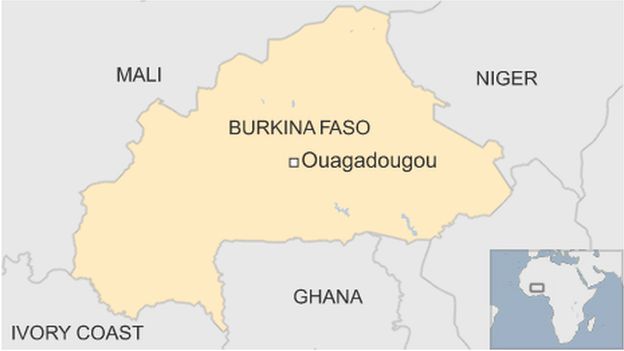
A similar attack by Islamist militants on a hotel in neighbouring Mali in November left 20 people dead.
Burkina Faso had recently held its first presidential election since a coup earlier last year.
That coup toppled long-time leader Blaise Compaore, who had governed for 27 years.
"We are still in a context of political fragility, so I think the timing of this attack is meaningful," Cynthia Ohayon, an analyst with the International Crisis Group, told the BBC from Ouagadougou.
"The country has long borders with Mali and Niger, and we know there are armed groups present on the border, so this was probably something we had coming."
Source: bbc.com
- Read more
-
15/Jan/2016
GNAT bleeds as Ex Gen.-Sec. purchases a GH¢48,000 vehicle for a mere GH¢7,000
The circumstances under which the recent past General Secretary of the Ghana National Teachers Association (GNAT), Mrs Irene Duncan-Adanusa, bought a two-year-old Toyota Hilux pick-up belonging to the association for a ridiculously low price of GH¢7,000 has angered many teachers in the country.
Some of the teachers who spoke to Weekend Finder have raised serious concerns regarding how prudent their contributions are being managed by their executives.
Documents available to Weekend Finder indicate that the former head of the association offered to pay an amount of GH¢7000 for a two-year-old Toyota Hilux pick-up.
A letter dated March 5, 2013 and authored by then head of the association read: “I wish to purchase one of the used official vehicles - Toyota Hilux Reg No. [The registration number was not stated.]
“I am therefore making an offer of GH¢7,000 (Seven thousand cedis) for the vehicle.
“Hoping my offer will be favourably considered”.
These were contained in a report of a committee of enquiry into allegations of corruption and mismanagement in the association.
According to information gathered from GNAT, the vehicle in question was bought at a value of GH¢48,828.10 in 2013 for official use.
Incoming General Secretary of GNAT, Mr David Ofori Acheampong, who is expected to take office on February 1, 2016, explained that due to the rigorous use of official vehicles of the association, they are changed every five years.
“The truth of the matter is that the vehicles that we use in doing our jobs have a life span of five years. If we buy the vehicles fresh, because of the way we travel, so after five years we dispose it off and buy new vehicles for the safety of our personnel”, he said.
He explained that as of 2013 when the car was auctioned to the then General Secretary, it had a book value of GH¢29,000.
He explained further that official vehicles of the association depreciate at a 20% rate every year.
Initially, Mr David Ofori Acheampong said he would find it hard to believe that the vehicle in question could be sold for GH¢7,000 because all the cars that were auctioned in 2014 had a value of not less than GH¢10,000.
“I don’t believe that there are any records to show that that particular vehicle was sold for GH¢7,000. Because I know that even some of the old Land Cruisers sold at about GH¢15,000.
“I will be very, very surprised if it is so”, he added.
After cross-checking the facts from the Accounts Office, and satisfying himself that the information was true, he came back to tell this reporter that the vehicle in question might be an “exit package” for the former boss.
Weekend Finder’s checks indicate that the car in question was not part of the exit package for the former head.
In our subsequent stories, this paper will update readers on its findings on how teachers’ contributions have been used by officials of the association.
By Daniel NONOR, of thefinderonline.com
- Read more
-
15/Jan/2016
Nigerian ex-military chiefs in arms fraud probe
The Nigerian president has ordered 20 former military chiefs and officers to be investigated over alleged arms procurement fraud.
Among them are the chiefs of defence and air staff under the last administration.
President Muhammadu Buhari's office said it was "on the recommendation of" a committee set up to examine procurement from 2007 to 2015.
The activities of 20 companies will also be investigated.
One of the names on the list is of a former security adviser to the government. Sambo Dasuki was charged in December over an alleged $68m fraud. He was accused of awarding phantom contracts to buy helicopters, fighter jets and ammunition.
He denied the allegations and said they were politically motivated.
A previous investigation found that phantom contracts worth $2bn had been awarded.
During the fight against Islamist militant group Boko Haram, many soldiers reported that they did not have enough equipment to take on the insurgents.
Others on the list include Alex Sabundu Badeh, a former chief of defence staff, and the former chief of air staff Adesola Nunayon Amosu. Both served under former President Goodluck Jonathan.
President Buhari was largely elected on a promise to tackle corruption.
The Economic and Financial Crimes Commission (EFCC) is spearheading the anti-corruption campaign.
Source: bbc.com
- Read more
-
15/Jan/2016
Burundi security troops gang-raped women, UN says
The United Nations says it has evidence that Burundi's security forces gang-raped women while searching the homes of suspected opposition leaders.
Security forces separated the women and raped them, the UN said, adding that it had documented 13 cases.
Forces also kidnapped, tortured and killed dozens of young men, it said.
Meanwhile, a court has sentenced four generals to life in jail for their part in trying to overthrow President Pierre Nkurunziza in May last year.
Nine other officers were jailed for 30 years and eight soldiers, including drivers and body guards, to five years for their role in the unrest sparked by Mr Nkurunziza's announcement that he would run for a third term.
He secured a third term in disputed elections in July.
More on Burundi
The abuses documented by the UN took place immediately after rebel attacks in December against three military camps in the country's capital, Bujumbura, the UN's human rights chief, Zeid Ra'ad al Hussein, said in a statement.
The UN believes the army is taking revenge for the attacks.
Mr Hussein also called for an investigation into reports that nine mass graves were found in and around Bujumbura, warning about the "increasing ethnic dimension of the crisis".
Some witnesses say that violence from security forces was directed at the Tutsi minority.
Burundi has been plagued by tension between Tutsis and Hutus since independence in 1962.
However, analysts say ethnicity is not at the heart of the conflict.
The failed coup leader, ex-General Godefroid Niyombare, who is on the run, is a Hutu.
His allies sentenced to life in jail by the Supreme Court were a mix of ethnicities.
Gen Cyrille Ndayirukiye, the former defence minister, and Hermenegilde Nimenya, a police general, are Tutsis and army generals Zenon Ndabaneze and Juvenal Niyungeko are Hutu.
Source: bbc.com
- Read more
-
15/Jan/2016
France clinical trial: 90 given drug, one man brain-dead
One man is brain-dead and another five people are in hospital after an experimental drug was administered to 90 people in a French clinical trial.
There is no known antidote to the drug, the chief neuroscientist at the hospital in Rennes said.
Of the five men in hospital, three could have permanent brain damage, Gilles Edan added.
Reports that the drug is a cannabis-based painkiller have been denied by the health ministry.
The trial, which involved taking the drug orally and has now been suspended, was conducted by a private laboratory in Rennes.
The experimental drug was manufactured by the Portuguese company Bial.
All those who volunteered for the trial have been recalled and the Paris prosecutor's office has opened an investigation.
Health Minister Marisol Touraine pledged to "get to the bottom... of this tragic accident".
"I was overwhelmed by their distress" she told reporters. "Their lives have been brutally turned upside down".
Analysis
By James Gallagher, health editor, BBC News website
This is the bitter price of the new medicines we take for granted. Testing such experimental drugs, at the cutting edge of science, can never be completely risk-free.
The safety and effectiveness of these drugs are rigorously tested in animals. The risks are low but there must still be a leap of faith when they are tried in people for the first time.
This trial has been taking place since July without such major events being reported. Generally in Phase I trials the dose is increased slowly over time, which could be why the side-effects are appearing now.
The hospitalised men started taking the drug regularly on 7 January and began showing severe side-effects three days later.
Three of the volunteers are now facing a lifetime of disability in this "accident of exceptional gravity".
It is a high price to pay, but thousands of people do safely take part in similar trials each year.
The trial was conducted by Biotrial, a French-based company with an international reputation which has carried out thousands of trials since it was set up in 1989.
In a message on its website, the company said that "serious adverse events related to the test drug" had occurred.
The company insisted that "international regulations and Biotrial's procedures were followed at every stage".
According to the health ministry, the adverse effects occurred on Thursday.
Clinical trials
Trials typically have three phases to assess a new medicine for safety and effectiveness
- Phase I tests for safety. A small number of people, sometimes healthy, and sometimes with a medical condition, are given a tiny dose of the drug under careful supervision, not to test if the drug works, but in order to check for any side effects
- Phase II sees the drug given to people who have a medical condition to see if it does indeed help them
- Phase III trials are only for medicines or devices that have already passed the first two stages, and involve them being compared to existing treatments or a placebo. The trials often last a year or more, involving several thousand patients
Has drug trial safety improved?
German medics challenge new EU clinical drug trials
Why some new drugs cost so much
The study was a Phase I clinical trial, in which healthy volunteers take the medication to evaluate the safety of its use, the ministry said.
Before any new medicine can be given to patients, detailed information about how it works and how safe it is must be collected.
Clinical trials are the key to getting that data - and without volunteers to take part in the trials, there would be no new treatments for serious diseases such as cancer, multiple sclerosis and arthritis.
Every year around the world thousands of people take part in clinical trials but incidents like this are very rare, the BBC's Hugh Schofield reports from Paris.
New EU regulations to speed up clinical drug trials and streamline testing procedures across the 28-nation bloc are due to take effect in 2018.
Source: bbc.com
- Read more
-
15/Jan/2016
MH370 search team finds second shipwreck
Search teams looking for the missing Malaysia Airlines MH370 think they have stumbled across a 19th-Century shipwreck.
Underwater sonar equipment turned up a strange object more than two miles beneath the waves just before Christmas.
Earlier this month they sent down an unmanned submarine to take a picture.
Experts at the Western Australian Museum think it is a 19th-century ship made of metal.
This is the second uncharted shipwreck found miles beneath the waves during the search for the missing plane.
Last year, investigators released ghostly images of man-made debris scattered along the sea floor, including what is clearly an old anchor.
The hunt for MH370 no longer makes headlines, but what some have described as the most complex search in history has continued for almost two years.
Three ships are methodically combing the belly of the southern Indian Ocean. Before this search, scientists knew more about the surface of the moon than the bottom of this stretch of water, so it is not surprising that they keep revealing secrets.
Along with the shipwrecks, a number of previously unknown underwater volcanoes have been discovered.
The search teams have now checked two thirds of the 120,000 sq km search zone.
Wing find
That is an area not much smaller than Greece, so mountainous that it dwarfs the Alps, with weather as hostile as any on earth. Because conditions are so dangerous, the three ships involved travel at walking pace.
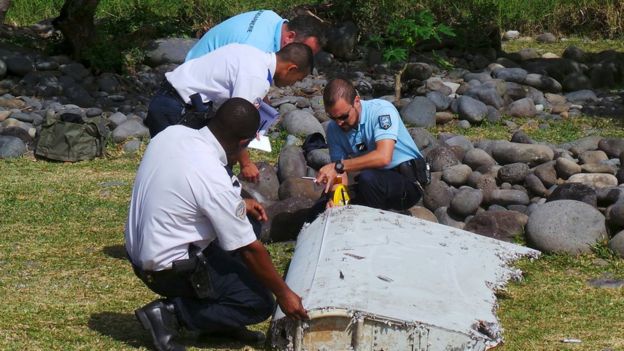
The search will conclude later this year and after that the authorities have admitted they will give up unless some debris is found.
They are confident they are looking in the right place after a piece of a wing from MH370 was washed up on an Indian Ocean island thousands of miles away.
Oceanographers have modelled the way the sea would have moved the fragment, and how long it would have taken to reach Reunion island.
They say it all points to the aircraft coming down where they are currently looking, although no-one has any idea why it ended up so far off course.
The plane had 239 people on board and was en route from Kuala Lumpur to Beijing on 8 March 2014 when air traffic controllers lost contact with it.
Last year Malaysia Airlines appointed Aer Lingus boss Christoph Mueller as chief executive in a bid to revive the ailing company.
In June the airline announced plans to axe 6,000 jobs from its 20,000-strong workforce and abandon unprofitable routes to stem substantial losses.
Source: bbc.com
- Read more
-
13/Jan/2016
Ethiopia cancels Addis Ababa master plan after Oromo protests
Ethiopia's government is set to abandon plans to expand the boundaries of the capital, Addis Ababa, which have caused months of deadly protests.
Demonstrations by people from the Oromo ethnic group have been sparked by fears that Oromo farmers could be displaced.
Human rights groups have estimated that at least 140 people were killed by security forces during the protests.
The ruling party in the Oromia region said it was dropping the plan following discussions with local people.
The Oromo People's Democratic Organisation (OPDO) made the decision after three days of talks, the state broadcaster EBC reports.
The OPDO, along with the Addis Ababa city authority, would have been responsible for implementing the "master plan".
Oromia is Ethiopia's largest region, and completely surrounds the capital.
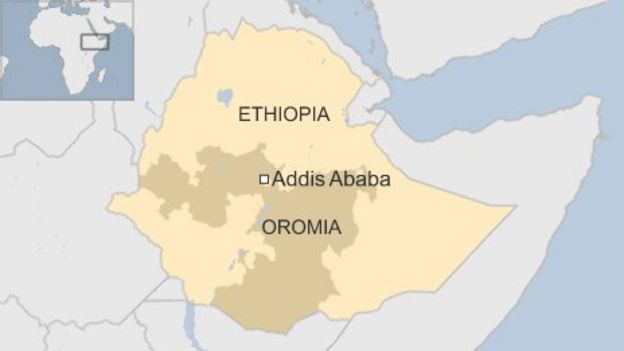
The government has disputed the death toll quoted by the New York-based Human Rights Watch, saying the figure was an overestimation.
Abiy Berhane from Ethiopia's London embassy told the BBC's Focus on Africa radio programme that the government "has been trying to avoid confrontation", but the protests were hijacked "by people whose intention it was to induce violent confrontation".
The government has also said that plan was going to be implemented only once "a consensus had been reached after in-depth and full discussions".
But a message on the Facebook page of a leading online campaigner says Oromo activists have "dismissed" the government's change of heart as "as too little too late".
The master plan was proposed as a way to incorporate the areas close to Addis Ababa into the capital's rapidly developing economy.
The recent wave of protests began in November last year, but anger over the proposed expansion of Addis Ababa goes back to 2014.
Observers say that the Oromo protests build on long-standing complaints that the community has been excluded from political and economic power.
At the last census in 2007, the Oromo made up Ethiopia's biggest ethnic group, at about 25 million people out of a population at the time of nearly 74 million.
Source: bbc.com
- Read more
-
13/Jan/2016
US thanks Iran for swift release of 10 Navy sailors
The US is investigating how the sailors entered Iranian waters.
Thanking Iranian authorities for their "co-operation and quick response", Mr Kerry said: "These are always situations which have an ability if not properly guided to get out of control...
"This kind of issue was able to be peacefully resolved and officially resolved, and that is testament to the critical role diplomacy plays in keeping our country safe, secure, and strong," he added.
Iranian state broadcaster Irib News has published pictures of the sailorsapparently being detained.
Iran-US relations pass a test: Jonathan Marcus, BBC diplomatic correspondent
The tentative and still largely potential softening of relations between Washington and Tehran in the wake of the nuclear deal seems to have passed a delicate initial test.
The Tehran authorities have quickly accepted that the US patrol boats strayed into their waters by accident.
The process to begin lifting the sanctions imposed on Iran due to its nuclear activities is expected to get under way at the end of this week.
There are many conservatives and hardliners in both countries who would dearly love to sabotage the deal. Consequently both governments may well have been eager to get this episode resolved as quickly as possible.
Clearly the economic benefits of lifting the sanctions may have been too great an inducement for the agreement to be derailed now.
Mr Kerry called Foreign Minister Mohammad Javad Zarif shortly after the incident. The pair developed a personal rapport during the nuclear talks.
Those detained - nine men and one woman - were taken to Farsi Island, in the middle of the Gulf, where Iran has a naval base.
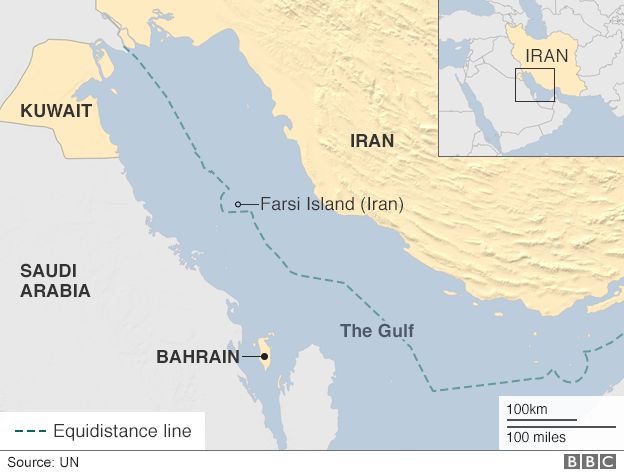
Conservatives in both countries have opposed the nuclear deal, under which Iran will limit its nuclear activities in exchange for the lifting of sanctions.
In the US, Republican presidential candidates were among those expressing outrage at the sailors' detention.
"Iran is testing the boundaries of this administration's resolve," said Marco Rubio.
"[Barack] Obama's humiliatingly weak Iran policy is exposed again," Jeb Bush said in a tweet before the sailors were released.
Donald Trump said Iran was "toying" with the US.
Iran's deputy nuclear chief has meanwhile denied a report the Arak heavy-water reactor had been decommissioned, which would be a final step towards implementation of the nuclear deal.
Restraint in Iranian media, by BBC Monitoring
Iranian state media's coverage of the incident has been studiously restrained and measured in tone.
The usual pejorative terms usually reserved for the US and other Western powers - such as "global arrogance" and "enemies" - have been conspicuous by their absence.
State TV and radio reports did highlight that the US incursion had been "illegal" and that Tehran wanted an apology, later reporting that it had got it.
The mood music was far less tense and confrontational than during the capture of British sailors in in 2007, with Iran insisting they strayed into its water - an accusation London denied.
Then, the Iranian media initially accused the UK servicemen of spying, and later mockingly reported that one of them had cried when his music player was confiscated.
Q&A: Iran's nuclear deal
What is it? In July, Iran agreed a landmark nuclear deal with six world powers to limit its sensitive nuclear activities for more than a decade in return for the lifting of crippling sanctions. The US is confident the agreement will prevent Iran from obtaining a nuclear weapon. Iran says it has the right to nuclear energy - and stresses that its nuclear programme is for peaceful purposes only.
When is 'implementation day'? Iran will not see the UN, US and EU sanctions lifted until the global nuclear watchdog, the International Atomic Energy Agency (IAEA), certifies that it has fulfilled its commitments under the deal. Iran reportedly says the IAEA will do so this Friday. US Secretary of State John Kerry says implementation will take place "within coming days".
What does Iran stand to gain? The sanctions have cost Iran more than more than $160bn (£102bn) in oil revenue since 2012 alone. Once they are lifted, the country will be able to resume selling oil on international markets and using the global financial system for trade. Iran has the fourth largest oil reserves in the world and the energy industry is braced for lower prices. Iran will also be able to access more than $100bn in assets frozen overseas.
Source: bbc.com
- Read more
-
13/Jan/2016
Barack Obama 'offered Biden money when son Beau sick'
President Barack Obama offered money to Joe Biden when his son was terminally ill, the vice-president has said.
Mr Biden's son later died from brain cancer but when he had lost the ability to speak and work, his father thought he might have to sell his home.
"Whatever you need, I'll give you the money," the president told his deputy over lunch, Joe Biden told CNN.
The vice-president also said Bernie Sanders was more "authentic" on inequality issues than Hillary Clinton.
The Vermont senator and the former US Secretary of State are leading the field in the Democratic race to succeed Mr Obama.
Backing from the popular vice-president would be a coup but like the president, Mr Biden refused to publicly support either candidate.
He did, however, imply Mr Sanders had more credibility on the issue of wealth disparity.
Sanders speaks to "a yearning that is deep and real", said Mr Biden, but Mrs Clinton was new to it.
"Hillary's focus has been other things up to now [but] no one questions Bernie's authenticity on those issues."
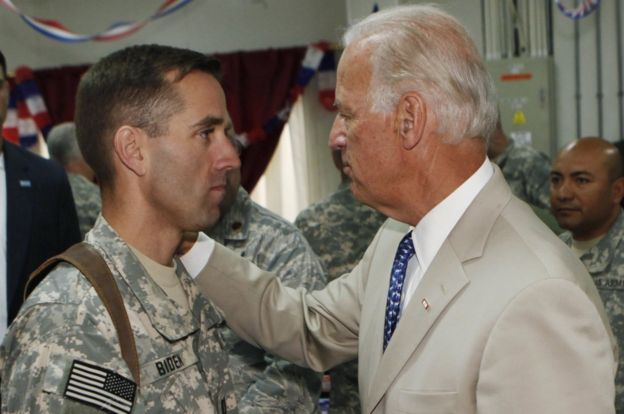
Beau Biden was a lawyer and US Army Captain
When he and the president had lunch and discussed Beau Biden's declining health, Joe Biden revealed his concern about how his son, Delaware's attorney general, would support his family.
The vice-president and his wife had discussed selling their house, he told Mr Obama.
"He said, 'I'll give you the money,'" recalled Mr Biden. "'Whatever you need, I'll give you the money. Don't, Joe, promise me. Promise me.'"
Beau Biden died in May last year. Months later, his father revealed he would not run for president in 2016.
Source: bbc.com
- Read more
-
12/Jan/2016
Hillary Clinton calls for end to 'divisive' deportation raids
Leading Democratic presidential candidate Hillary Clinton has called for an end to deportation raids targeting Central American families living in the US illegally.
A spike in raids in recent weeks, largely aimed at women and children, has drawn the ire of rights groups.
Mrs Clinton said the raids "have sown fear and division in immigrant communities across the country".
Immigration has been one of the leading issues in the 2016 race.
Mrs Clinton, who is top of the Democratic pack in the race, said she would ensure government lawyers were provided for unaccompanied minors and would increase funding for immigration courts.
The raids, which spiked over the holiday season, have angered migrants' rights activists as well as lawmakers in Mr Obama's Democratic party.
Why are the raids happening?
They come as fears grow that a spike in immigration from Central America may be foreshadowing a repeat of the 2014 crisis that saw tens of thousands of migrants - especially unaccompanied children - cross the border.
The White House has defended the raids, with spokesman Josh Earnest saying the president was aware of the outrage but that "the enforcement strategy and priorities that the administration has articulated are not going to change".
The Obama administration has unilaterally enacted immigration reform to protect undocumented immigrants who have been in the country a long time, but has said deportations would continue. In February, Mr Obama said that the forced removals would be "focusing on potential felons".
"I think the administration sees is as important to complete some of these removal orders to discourage future irregular immigration from Central America," Marc Rosenblum of the Migration Policy Institute told the BBC.
"It's difficult to grant relief to deserving cases if you're not also going to deport cases found not to be deserving."
What has the reaction been?
The raids have riled lawmakers and activists, who say they are disruptive and ill-timed, and were breaking families apart as well as spreading fear across immigrant communities.
Rep Nydia Vlazquez, a member of the Hispanic caucus, said that "immigrants and their families are terrorised".
"These are some of the most vulnerable members of society and we are treating them like criminals."
The anger prompted White House officials to meet with politicians on Thursday in an attempt to dampen the anger.
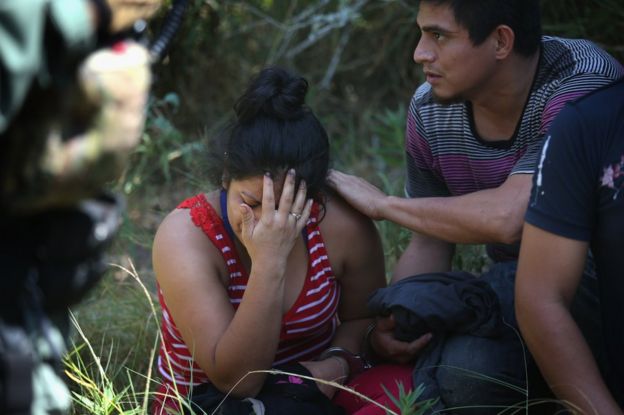
A man comforts a woman after immigration authorities detain them
How has immigration played in the 2016 campaign?
Leading Republican candidate Donald Trump prompted a weeks-long outrageover the summer when he described Mexican immigrants as "rapists" and "criminals" and called for a wall to be built on the southern border.
Meanwhile, one of his rivals, Marco Rubio, is framing the issue as one of national security, saying that radical jihadist groups could exploit the immigration system.
Mr Rubio's support for immigration reforms in the past could be a liability for the candidate during primary elections, as he attempts to climb to the top of the crowded and mainly conservative Republican pack.
Democrats have taken a different approach to the issue, urging a humanitarian response.
Senator Bernie Sanders, currently in second place, wrote a letter to President Obama earlier this month saying: "I urge you to immediately cease these raids and not deport families back to countries where a death sentence awaits."
Martin O'Malley, who is in a distant third place, has attacked his two rivals saying that their support for immigrants was recent and politically expedient.
Source: bbc.com
- Read more
-
12/Jan/2016
Kenya's Evangelical Alliance opposes registration plan
Kenya's evangelical churches have condemned government plans to make it tougher for religious bodies and clerics from all faiths to operate.
The move was aimed at stopping the growth of evangelical churches, said the Evangelical Alliance of Kenya.
But a leading Anglican cleric welcomed the proposals as an attempt to end the "commercialisation" of religion.
The proposals require all religious bodies to register, and for preachers to have police clearance.
All religious institutions would also be required to submit their statements of faith to a government-backed body for examination.
Christians form the majority in Kenya, while Muslims are the second-largest group.
Their main body, the Supreme Council of Kenya Muslims, was also opposed to the proposals, warning they could violate "freedom of worship and amount to a clampdown on religious institutions", the privately owned The Standard newspaper reports.
The Catholic Church - the largest Christian denomination in Kenya, and to which President Uhuru Kenyatta belongs - has not yet commented on the proposals.
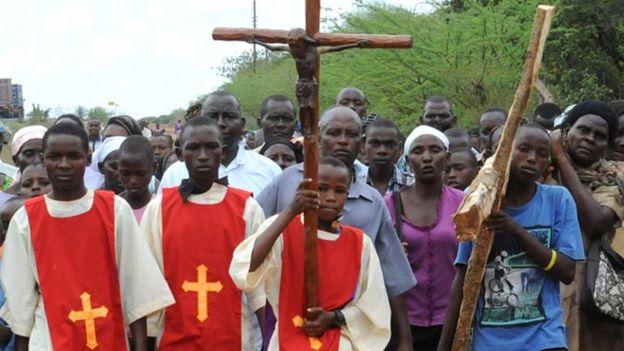
The BBC's Muliro Telewa in the capital, Nairobi, says Attorney-General Githu Muigai unveiled the proposals last week, and would hold public consultations before drafting legislation.
Other proposals include:
- All preachers have to undergo theological training at a reputable seminary
- The Ethics and Anti-Corruption commission will have to certify that clergy are not corrupt and
- Foreign pastors will need a work permit, and a recommendation from their government
Our correspondent says the proposals seem to target self-proclaimed Christian prophets and faith healers whose influence is growing, as well as Muslim preachers who promote extremism in a country where militant Islamist group al-Shabab is active.
Election threat
The Evangelical Alliance of Kenya (EAK) said it would launch a campaign to obtain three million signatures to block the government from enforcing the proposals.
"Registration of churches was stopped since 2014. We believe this is meant to stop evangelism and growth of the church since other societies are being registered freely," said EAK chairman Bishop Mark Kariuki, the private Daily Nation newspaper reports.
He warned that the EAK would urge its followers not to vote for the government in elections next year if it implemented the proposals.
He said: "2017 is very close and we will not hesitate to use those [voter] cards."
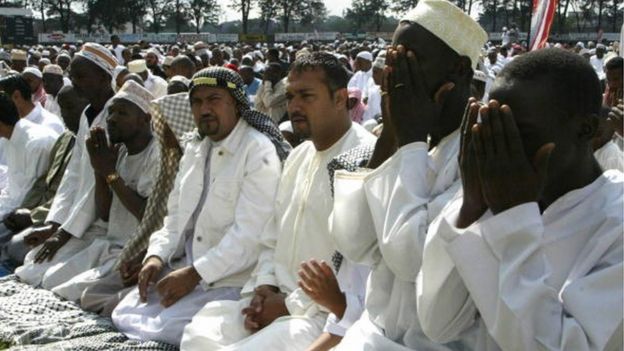
Muslims are the second-biggest religious group in Kenya
However, Anglican Church of Kenya Bishop Beneah Salah said government intervention was needed because the church was not in a healthy state.
"Horrible things are happening in the church today. There is a lot of commercialisation of the gospel with this prosperity gospel," he is quoted by The Standard as saying.
"Perhaps God is using the state to punish the church as he did in the past, where he used kings or nations to discipline the church," he added.
The head of the tiny Atheists in Kenya group, Harrison Mumia, said the government had a responsibility to protect desperate Kenyans from faith healers who took advantage of them.
Last week, Kenya's Communications Authority published new broadcasting regulations which will ban preachers from soliciting money on air.
Source: bbc.com
- Read more
-
12/Jan/2016
Turkey: 'IS suicide bomber' kills 10 in Istanbul Sultanahmet district
Turkish Prime Minister Ahmet Davutoglu telephoned German Chancellor Angela Merkel to offer his condolences, the Anadolu news agency said.
Mr Davutoglu later said: "We have determined that the perpetrator of the attack is a foreigner who is a member of Daesh [IS]."
Analysis: BBC's Paul Wood in Istanbul
The shops and restaurants around the Blue Mosque are open tonight but deserted - no surprise when the German government has warned its tourists to stay away from crowded open areas.
The Turkish government now firmly believes this was an attack by the so-called Islamic State - a reflection of Turkish foreign policy, with Turkey an increasingly active part of the US coalition against IS.
One source said Turkey had taken the lead recently at a meeting of anti-IS armed groups on the Syrian border. IS has been losing territory in Iraq and in Syria. The Syrian town of Manbij may be next to fall - there are reports of IS commanders pulling out.
As IS comes under pressure, it has warned of more attacks against its enemies - not only in Turkey, but in Europe and the US.
He vowed to find and punish those linked to the bomber and pledged to continue the fight against IS militants.
Mrs Merkel said: "Today Istanbul was the target, before Paris, Copenhagen, Tunis... The terrorists are the enemies of all free people, indeed the enemies of all humanity."
Foreign Minister Franz-Walter Steinmeier said at least eight Germans were dead, following initial reports of nine.
Turkey's Deputy PM Numan Kurtulmus said earlier: "It has been identified that the suicide bomber is Syrian."
The suspect was said to have been born in 1988 and was identified from body parts.
Some Turkish media said the suspect had been born in Saudi Arabia.
Mr Kurtulmus said the suspect was not on Turkey's militant watch-list and was believed to have recently crossed into Turkey from Syria.
Turkey last year took a more active role against IS in Syria, carrying out air strikes and allowing US warplanes to use its Incirlik base for missions.
'Further trouble'
Eyewitness Murat Manaz said: "It was a suicide bomb. I went there and saw it and came back to the hotel. There was chaos. Everybody was running somewhere.
"Policemen did not see this coming. They were distressed but at the same time they were trying to evacuate the area because they said there was a possibility that a second bomb could go off."
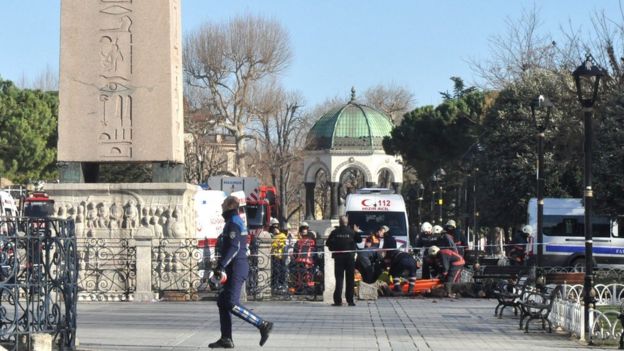
Bishop Pat Buckley, from Northern Ireland, had been taking photos in Sultanahmet Square shortly before the blast and had moved on into the Blue Mosque.
He told the BBC: "I have lived in Northern Ireland since the 70s, and I have heard explosions, and this was incredibly loud. I saw dust through the doorway of the mosque and I could smell the explosives."
He added: "I am slightly worried because there is talk here that they are expecting further trouble and we have been warned to avoid crowds."
One Norwegian was confirmed among the injured.
Germany currently provides the largest number of tourists visiting Turkey. In 2014, 23.6 million people visited, with the top three:
- Germans - 5.1 million (21.5%)
- Russians - 3.7 million (15.6%)
- Britons - 1.5 million (6.3%)
What is the security situation in Turkey?
Turkey faces myriad security threats and establishing which group is behind this latest attack will be a matter of urgency. The Islamic State group has been blamed for three bombings in Turkey in the past year, including an attack in Ankara that killed more than 100 people. Violence has also soared between Turkish security forces and PKK militants, battling for more autonomy for the Kurds, after a ceasefire agreement broke down in July. A PKK offshoot, the TAK, fired a mortar at Istanbul airport last month. Far left groups are also active in Turkey, and a female suicide bomber attacked a police station in Istanbul's Sultanahmet district last year.
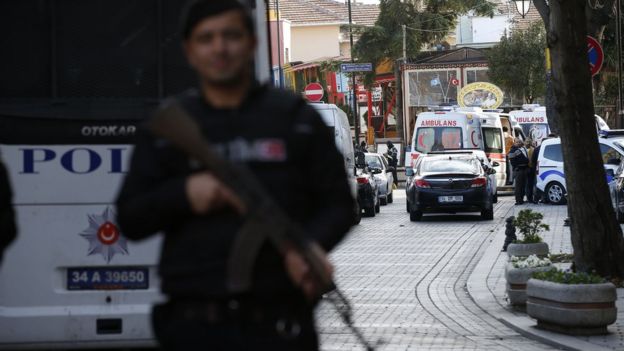
Who could be behind the latest attack?
President Erdogan has blamed a "suicide bomber of Syrian origin". The conflict in Syria has not only seen the rise of IS but also strengthened the PKK's offshoot in Syria, known as the YPG. There was no immediate claim of responsibility, but correspondents point out that IS was similarly silent following previous attacks last year that were widely blamed on the jihadist group.
How is the Turkish government responding?
Last year Turkey agreed to take a more active role in the US-led campaign against IS, carrying out air strikes in Syria. It also allowed US warplanes to strike IS targets from its base in Incirlik and moved to tighten security along its 900km (560 mile) border with Syria. Meanwhile Turkish forces have also been targeting Kurdish militants in northern Iraq. And violence has flared in Turkey's mainly Kurdish south-east, where the Turkish military says it has killed some 600 PKK militants over the past month, according to Anadolou Agency.
Turkey violence: How dangerous is instability?
Turkey v Islamic State v the Kurds: What's going on?
Source: bbc.com
- Read more
-
12/Jan/2016
‘It’s an error for Mahama to reward Koala driver’
A legal scholar, Professor Stephen Kwaku Asare, has condemned President John Mahama over his decision to reward the taxi driver who foiled a robbery operation with a house.
The Cabby rammed his car into the motorbike of two robbers - Abaliku Sannie, 35, and Oko Quaicoo, 30 - who shot at a sales girl of the Koala Supermarket on her way to deposit sales at the bank.
The supermarket is getting him a new car, the police has scheduled to honour him in addition to a house being sponsored by the Mahama-led administration.
Prof. Asare feels the initiative of the government is laudable, but could be a recipe for disaster.
“But the State should be more careful. Driving your car into someone is a crime, even if the person is a suspected criminal. As tempting as it is to be seen to be endorsing what the Driver did, I strongly believe it is error for the President to reward it,” the US-based Ghanaian law professor posted on his Facebook.
Below is his full post:
“Does the President's state funded reward to the Koala Taxi Driver endorse vigilantism as part of the criminal justice system?
“PS: For the avoidance of doubt, I do not have any difficulties with the Koala Driver. I like what he did and would easily give him a reward.
“But the State should be more careful. Driving your car into someone is a crime, even if the person is a suspected criminal. As tempting as it is to be seen to be endorsing what the Driver did, I strongly believe it is error for the President to reward it.
“Let us not forget that the Koala driver saw something and acted. Someone may have only seen the driver running into the suspects. Will that someone, seeing the driver running into what the driver thought were suspects but whom the someone thinks are regular motor bikers, be justified in pouncing on the driver and pouring acid on him?
“State supported Vigilantism will put all of us on a slippery slope to chaos.
“Da Yie!”
The robbers shot the sales girl on her way to deposit the previous day’s sales at the bank. While bolting, the driver rammed into the motorbike of the thieves, forcing them into a nearby drain.
An armed soldier who chanced on the scene intervened to effect the arrest of the duo, who were still shooting in their injured state.
Source: starrfmonline.com
- Read more
-
12/Jan/2016
Bus rebranding: Smarttys, AG agree on GHC1.9M refund plan
Lawyers of Smarttys Management Limited – the company that rebranded government buses at a controversial amount- have met with the Attorney General to discuss a refund plan for the excess amount in the contentious contract.
This was disclosed by President John Mahama at a media briefing at the Flagstaff House Tuesday.
According to him, government is bent on retrieving the GHC 1.9 million excess payment as advised by the attorney general and will not relent on it.
The GHC3.6 million that was given to Smarttys for rebranding 116 government buses became a matter of public concern as many Ghanaians were incensed by the outrageous fee charged by the company owned by actress Selassie Ibrahim.
“...Yesterday, the lawyers of the company met with the Attorney General to agree on a payment plan to refund the excess money,” Mr Mahama stated.
Transport minister Dzifa Attivor resigned her post after the Chief of Staff Julius Debrah ordered a probe into the controversial contract.
Source: StarrFMonline.com
- Read more
-
12/Jan/2016
Security Analyst refutes claims by Gitmo detainees they are innocent
Security Expert, Dr Kwesi Aning, wants claims by the two former Guantanamo Bay detainees that they are not a part or against any terrorist group to be taken with a pinch of salt.
The Director of the Faculty of Academic Affairs and Research at the Kofi Annan Peace Keeping Centre says the claims by the two detainees during an interview on Accra-based Uniq FM Monday could be a ruse.
"The nature of terrorist recruitment strategies and the brainwashing that takes place means that these guys are highly-trained operatives, they know how to tell stories that seem convincing and they will continue to do what they've done," Dr Aning told Joy News' Kwabena Owusu-Ampratwum.
The two former terror suspects, Mahmud Umar Muhammad Bin Atef and Khalid Muhammad Salih Al-Dhuby said they are grateful to President John Mahama for providing them a new home in Ghana and have reolved to lead peaceful lives.
They say they are innocent people who were unjustifiably detained by the United States government for 14 years.
They insist they are not a threat to Ghana.
"We are not a part or against any group like Al qaeda or other things. We do not belong to any part of them.
"We are here and want to live a normal life. We have been wrongly arrested for 14 years without any charge against us.
"We want to live in Ghana quietly and peacefully. We are happy for the warm reception accorded to us," one of the detainees said during the interview.
The Uniq FM interview is seen by many as a strategy to quell public fear of a possible terror attack as Ghana accepts the detainees from the US government.
However, Dr Aning thinks the interview on Monday evening was unnecessary and a deception.
"If the US, with all its enhanced interrogation techniques could not break these people down and they now have the perception that these people are safe, I am worried and disturbed that we are giving such platform to these individuals to try and convince a nation of 24 million people that they are peaceful," he stated.
Dr Aning cited a US Department of Defence report in 2009 that described Mahmud Umar Muhammad Bin Atef as posing a high risk to the United States, its interest and allies to drum home his point that the two detainees pose a threat to the country's security.
"They [the US] are telling us seven years down the line that their assessment has changed. That raises even more questions.
"If those assessments are now perceived to be wrong, what assessments were made in terms of the way in which their supporters and those groups that they belong to will react to their being brought to Ghana. What will be the perception of Islamic State in West Africa, that is the previous Boko Haram and Al qaeda " he demanded.
Source: myjoyonline.com
- Read more
-
11/Jan/2016
We are not part or against any terrorist group - Terror suspects break silence
The terror suspects and former detainees at Guantanamo Bay who are now in Ghana say they are not a part or against any terrorist group.
The two, Mahmud Umar Muhammad Bin Atef and Khalid Muhammad Salih Al-Dhuby are gracious to Ghana's president for providing them a new home in Ghana and have promised to lead peaceful lives.
They insist they are innocent people who were unjustifiably detained by the United States for 14 years but they were quick to add that they are not a threat to Ghana.
The admission into Ghana of the two detainees have been a raging controversy in the country with many Ghanaians accusing the government of risking the security of its citizenry.
Political parties, civil society groups, including the Christian Council of Ghana have all kicked against government's decision to accept the two. But the government says it accepted to admit the two as part of an obligation to the international community.

In the midst of the controversy, the two suspects have for the first time broken their silence.
Speaking in an interview on Uniq Fm, the detainees assured Ghanaians they are not a threat.
"We want to thank the president and the good people of Ghana for the decision they made to accept us.
"We are not a part or against any group like Al qaeda or other things. We do not belong to any part of them.
"We are here and want to live a normal life. We have been wrongly arrested for 14 years without any charge against us.
"We want to live in Ghana quietly and peacefully. We are happy for the warm reception accorded to us," one of them stated.
Source: http://myjoyonline.com
Listen to the audio below
- Read more
-
11/Jan/2016
Former China deputy security chief Li Dongsheng jailed
China's former deputy national police chief Li Dongsheng has been jailed for 15 years for corruption offences, according to state media.
Li had ties to Zhou Yongkang, jailed for life in June in one of China's biggest ever corruption scandals.
The sentence was reported on an official China Central Television social media account.
The former deputy security minister stood accused of taking nearly 22m yuan ($3.3m; £2.3m) in bribes.
He was also accused of abuse of power in positions he held between 1996 and 2013, according to state media reports at the time.
Li was formally sacked in February last year, after coming under investigation, along with several other former associates of Zhou Yongkang.
Zhou served as China's security chief before retiring in 2012.
The former politician - one of the most senior in China - was convicted of a series of corruption charges, including bribery, abuse of power and leaking state secrets.
Source: bbc.com
- Read more
-
11/Jan/2016
Evacuation call at starving Syrian town
Some 400 people in the besieged Syrian town of Madaya need to be urgently evacuated for medical treatment, says UN humanitarian chief Stephen O'Brien.
After briefing the UN Security Council on the crisis in the rebel-held town near Damascus, he warned that those people could die.
Earlier, an aid convoy brought food to 40,000 town residents who have been under government siege for six months.
The UN says it has received credible reports of people dying of starvation.
Simultaneously, aid lorries entered two towns besieged by rebel forces in the northern province of Idlib under a deal between the warring parties.
The situation in Foah and Kefraya is also said to be extremely dire, with an estimated 20,000 people trapped there since March.
The arrival of the aid was delayed until both sets of lorries were ready to enter the towns.
Syria's civilians living a 'life worse than death'
'Simply too weak'
Mr O'Brien was speaking at the UN headquarters in New York after the Security Council held an urgent meeting to discuss the crisis.
"I've just been told by the humanitarian co-ordinator, Yacoub El Hillo, that whilst he was at the hospital in Madaya he saw that there were around 400 people who must be evacuated immediately.
"We must seek to do this and put the arrangements in place as soon as possible for medical treatment. Or they are in grave peril of losing their lives and dying with either the causes being from malnutrition or for complications for other medical reasons," Mr O'Brien said.
A few town residents were given permission to leave and could be seen with belongings awaiting evacuation.
In total, some 44 lorries operated by the UN, the International Committee of the Red Cross (ICRC), the Syrian Red Crescent and the World Food Programme (WFP) reached Madaya from Damascus on Monday.
The convoy brought in food and medicines, as well as blankets, shelter materials and soap.
The distribution of supplies was expected to continue through the night.
Pawel Krzysiek, who is with the ICRC in Madaya, said after arriving: "The people... were coming every five minutes asking, 'Listen, did you bring food, did you bring medicine?'
"Some are smiling and waving at us but many are just simply too weak, with a very bleak expression, too tired."
Mr El Hillo told the BBC that UN staff saw starving children in the town.
One resident, Hiba Abdel Rahman, 17, told the AFP: "For 15 days we have been eating only soup.
"I saw a young man killing cats and presenting the meat to members of his family as rabbit. Some people went through garbage bins, others ate grass. We sought food from the fighters but they refused to give it to us."
Madaya, which is about 25km (15 miles) north-west of Damascus and 11km from the border with Lebanon, been besieged since early July by government forces and their allies in Lebanon's Shia Islamist Hezbollah movement.
Meanwhile, 21 lorries on Monday entered Another entered Foah and Kefraya.
They were carrying basic food items - including rice, vegetable oil, flour, sugar and salt - as well as water, infant formula, blankets, medicines and surgical supplies.
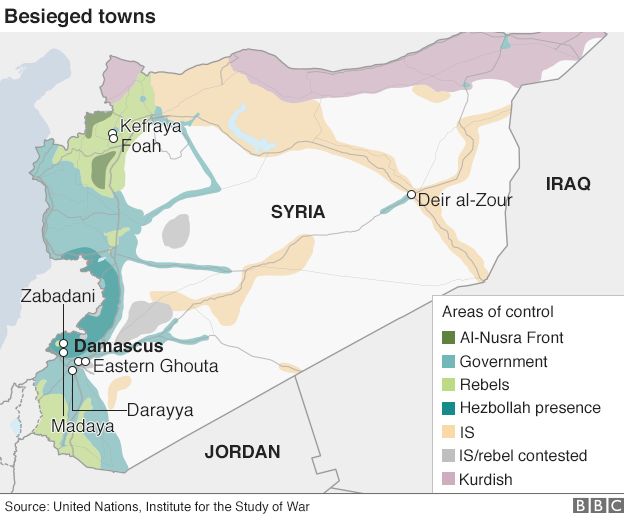
Medical charity Medecins Sans Frontieres (MSF) said on Sunday that a total of 28 people - including six children less than one year old - had died of starvation in Madaya since 1 December.
However, Syrian officials and Hezbollah have denied that there have been any deaths in the town.
"The Syrian government is not and will not exert any policy of starvation against its own people," Syria's UN ambassador Bashar Ja'afari was quoted as saying by the Associated Press.
Rebel leaders were also accused of selling food to Madaya residents at exorbitant prices.
Blockades have been a feature of Syria's civil war. Up to 4.5 million people live in hard-to-reach areas, including nearly 400,000 people in 15 besieged locations who do not have access to life-saving aid.
What's happening in Syria?
More than 250,000 Syrians have lost their lives in almost five years of conflict, which began with anti-government protests before escalating into a brutal civil war. More than 11 million others have been forced from their homes as forces loyal to President Bashar al-Assad and rebels opposed to his rule battle each other - as well as jihadist militants from Islamic State.
Why are civilians under siege?
All parties to the conflict are using siege warfare, encircling populated areas, preventing civilians from leaving and blocking humanitarian access in an attempt to force opponents to surrender. Shortages of food, water, medicine, electricity and fuel have led to malnutrition and deaths among vulnerable groups.
Where are the sieges?
Government forces are besieging various locations in the eastern Ghouta area, outside Damascus, as well as the capital's western suburb of Darayya and the nearby mountain towns of Zabadani and Madaya. Rebel forces have encircled the villages of Foah and Kefraya in the northern province of Idlib, while IS militants are besieging government-held areas in the eastern city of Deir al-Zour.
Source: bbc.com
- Read more
-
11/Jan/2016
Koala supervisor, three others arrested in a botched robbery
Police have arrested a supervisor at the Cantonments branch of Koala Shopping Mall in Accra after his alleged role in a foiled robbery attempt Saturday.
Greater Accra Region Police Public Relations Officer ASP Afia Tenge told Joy News, Gilbert Osabutey allegedly gave information to two armed robbers leading to an attack on a colleague who was on her way to deposit money at the bank.
The incident occured at about 10am and involved two robbers including a Nigerian and an accomplice, Doe Ahiagbeku 28, alias 'Old Soldier' who is a security man at ACACIA Construction firm. They have been arrested and are assisting the police in their investigations.
The robbers - Abaliku Sannie 35 and Oko Quaicoo 30 - who were on a motor bike shot at the lady in an attempt to take the company's money she was carrying.
Apparently, she had been sent by her office, Koala Shopping Mall, to deposit the undisclosed amount at the bank.
A taxi driver who witnessed the incident, gave the two a chase and knocked them down. They were arrested by passers-by.
“The police preliminary investigations indicate that the entire robbery was masterminded by the supervisor of the Koala Shopping Mall,” ASP Afia Tenge said.
Extracts of a video of the arrest of the two robbers circulating on social media show angry eyewitnesses pouncing on them to ensure they don’t run away.
The victim who sustained gunshot wounds in her thigh and calf is receiving medical attention.
The robbers are also responding to treatment.
ASP Afia Tenge indicated that the taxi driver whose effort helped in arresting the robbers would be rewarded by the police administration and including repairing his damaged vechilce.
Source: myjoyonline.com
- Read more
-
11/Jan/2016
UN aid convoy to leave for besieged Syrian town
An aid convoy is expected to leave for Madaya, a Syrian town under government siege, where people are reported to have been starving to death.
"We are pretty confident," UN refugee agency spokesperson Melissa Fleming told the BBC.
A convoy which had been due to reach the rebel-held town on Sunday was delayed by last-minute hitches.
Some 40,000 people are in Madaya, near Lebanon's border, with residents said to be eating pets and grass to survive.
Syria: The story of the conflict
Where key countries stand on Syria
"I have just got confirmation that our humanitarian convoy will leave tomorrow (Monday) morning," Ms Fleming said.
"This is typical that it takes a while - the administrative hurdles are constant," she added.
Meanwhile, Brice de la Vigne from the Medecins Sans Frontieres (MSF) medical charity described the situation in the town as "quite horrific".
Mr de la Vigne, whose organisation has been in contact with doctors inside Madaya, told the BBC that more than 250 people there had "acute malnutrition".
He added that "10 of them need immediate medical evacuation" or they would die.
The World Food Programme (WFP) earlier had hoped to take a first shipment of food and medicine to Madaya.
It was not clear what caused the delay but the BBC's Jim Muir in Beirut says negotiating access across battlefronts in a siege situation has always been a tricky business.
It involves agreement at the top political level on both sides of the conflict, as well as individual fighters on the ground.
A similar operation for two government-held villages in the north - Kefraya and Foah - has also been discussed.
Blockades have been a feature of Syria's civil war but the plight of Madaya has drawn international attention, partly due to images emerging of severely malnourished residents.
Up to 4.5 million people in Syria live in hard-to-reach areas, including nearly 400,000 people in 15 besieged locations who do not have access to life-saving aid.
Madaya has been besieged since early July by government forces and their allies in Lebanon's Shia Islamist Hezbollah movement.
The situation in Foah and Kefraya, under siege from rebels, is also reported to be worsening, with an estimated 30,000 people trapped.
What's happening in Syria?
More than 250,000 Syrians have lost their lives in almost five years of conflict, which began with anti-government protests before escalating into a brutal civil war. More than 11 million others have been forced from their homes as forces loyal to President Bashar al-Assad and rebels opposed to his rule battle each other - as well as jihadist militants from Islamic State.
Why are civilians under siege?
All parties to the conflict are using siege warfare, encircling populated areas, preventing civilians from leaving and blocking humanitarian access in an attempt to force opponents to surrender. Shortages of food, water, medicine, electricity and fuel have led to malnutrition and deaths among vulnerable groups.
Where are the sieges?
Government forces are besieging various locations in the eastern Ghouta area, outside Damascus, as well as the capital's western suburb of Darayya and the nearby mountain towns of Zabadani and Madaya. Rebel forces have encircled the villages of Foah and Kefraya in the northern province of Idlib, while IS militants are besieging government-held areas in the eastern city of Deir al-Zour.
Source: bbc.com
- Read more
-
11/Jan/2016
About Us
-
Archives
Recent posts
News for people who want to know
- Bakus Radio resource for |Ghana & Africa music |News |Entertainment |Sports | Copyright © 2016 . All Rights Reserved.
- Designed By Fresco Software Solution Pvt. Ltd.



























